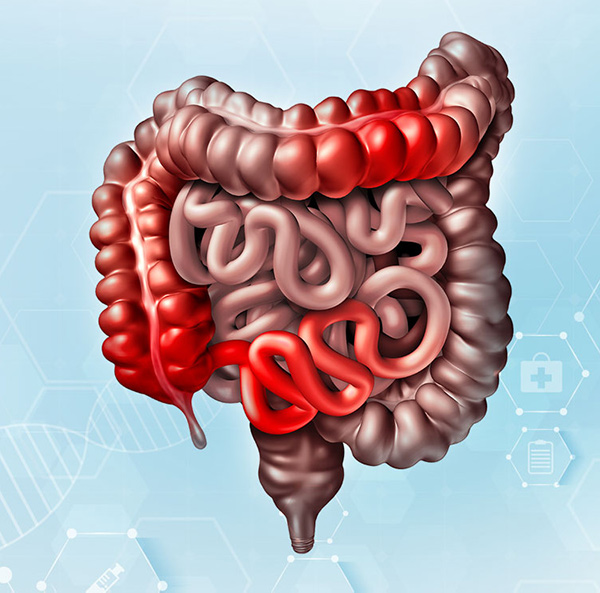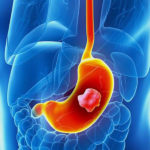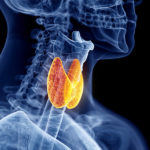 Wróć do poprzedniej strony
Wróć do poprzedniej strony
Crohn’s disease – symptoms, diagnosis, treatment

Crohn’s disease is a chronic inflammatory bowel disease manifested by diarrhea, abdominal pain, anemia, weight loss, and malnutrition, and its late complication can be colorectal cancer.
Although there is no causal treatment for Crohn’s disease, therapy can reduce symptoms and even lead to long-term resolution. Find out more about symptoms, diagnosis, and treatment.
Treatment of Crohn's disease
Integrative Care
At IMC, you will benefit from Integrative Chronic Diseases Care designed to speed up physical and emotional recovery, improve quality of life, better tolerate treatment-related side effects and prevent relapse.
An integrative program for chronic diseases treatment can be applied to start from the initial to the advanced stages of chronic diseases, even during the phases when conventional medicine has nothing more to offer. The first step of the integrative approach is a precise and detailed assessment of the patient’s physical, emotional, and body state. The doctor collects the results of biochemical tests, molecular tests, clinical examinations, information about other illnesses, lifestyle, diet, and emotional state. Since the patient’s biological state changes during therapy, the treatment program is updated according to the laboratory and clinical tests. Every aspect of the treatment program is personalized to suit each patient’s individual needs.
Treatment includes:
- integrative medical consultation and monitoring,
- ten sessions of local hyperthermia,
- ozone therapy (autochem transfusions),
- intravenous vitamin infusions,
- ultrasound,
- laboratory tests,
- psychotherapy,
- group workshops such as mindfulness, breathing,
- personalized nutrition,
- and accommodation.
Contact us:
1. Call us: +48 730 597 597
2. Send application form
- Go to Natural chronic diseases treatment
- At the bottom of the page, select your disease
- Complete the form, and we will contact you
What is Crohn's disease?
Crohn’s disease (Crohn’s disease) is an autoimmune disease. It is a chronic inflammatory disease. The inflammatory process caused by this disease affects the wall of the gastrointestinal tract and can involve different areas of the gastrointestinal tract – from the mouth to the anus.
Most often, however, it takes place in the terminal ileum. Along with ulcerative colitis, it is classified as an inflammatory bowel disease (IBD).
The term Crohn’s disease, used in Polish medical literature, is derived from the names of the doctors who first described the symptoms of the disease. Polish physician Antoni Leśniowski did so as early as 1904, and American Burrill Bernard Crohn and his colleagues did so in 1932.
How common is Crohn's disease?
Crohn’s disease is more common in industrialized countries. In Europe, the incidence is about 5 per 100,000 people per year and is on an upward trend. In the Polish Crohn’s disease registry, 6324 cases were recorded (data from 95 centers as of September 2018). However, it is believed that the number of patients is higher.
It most often begins in adolescence and early adulthood (usually between the ages of 15 and 25). The second peak of newly diagnosed cases is in people over the age of 60. An increasing number of cases in children are also being reported. The condition more often develops in people whose first-degree relatives (siblings, children, and parents) have inflammatory bowel disease.
Symptoms of Crohn's disease
Crohn’s disease is characterized by phases of exacerbation and remission (periods when symptoms are not present). When the disease is active, symptoms may appear such as:
- diarrhea,
- fever,
- fatigue,
- anemia (anemia),
- abdominal pain and cramps (the pain usually affects the lower abdomen on the right side, which is sometimes mistaken for appendicitis),
- blood in the stool,
- Aphthas, ulcers and pain in the mouth,
- decreased appetite and weight loss,
- malnutrition,
- pain and discomfort in the anal area, which can mark, for example, fissures, abscesses and fistulas (abnormal connections between different parts of the body).
In some, more severe cases, extraintestinal symptoms may also be present, such as.
- inflammation of the skin, eyes and joints,
- inflammation of the liver or bile ducts.
- The symptoms of Crohn’s disease are non-specific (they can also appear in the course of other diseases).
Causes of Crohn's disease
The exact cause of Crohn’s disease is not known. The lesions are thought to be influenced by:
- genetic conditions,
- environmental factors (intestinal flora bacteria),
- immunological factors.
Many researchers lean toward the theory that bacterial infection is the cause of the disease.
In contrast, hypotheses that diet or stress are responsible for causing Crohn’s disease are considered unlikely. Although both factors may exacerbate the symptoms of the disease.
Contact information
55-010 Żerniki Wrocławskie
Working hours
Have a question?
Use the quick contact form!
Contact information
55-010 Żerniki Wrocławskie




